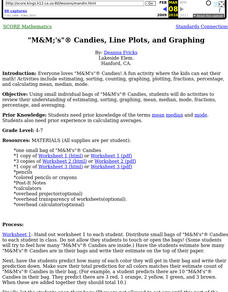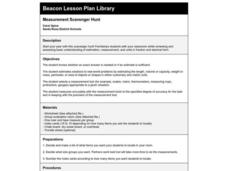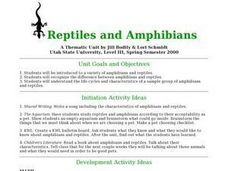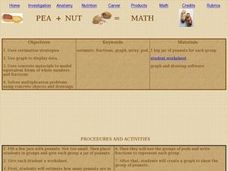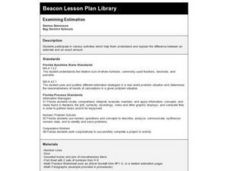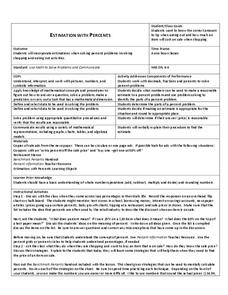Curated OER
M&Ms; Line Plots and Graphing
Students, using small individual bags of M&Ms, engage in activities including; estimating, sorting, graphing, mean, median, mode, fractions, percentage, and averaging.
Curated OER
I'll Halve S'More, Please!
Students describe a fraction in terms of sharing parts of a whole. They understand the meaning of the parts of a fraction and add and subtract like fractions. They apply fractions to problem situations and recognize and use equivalent...
Pennsylvania Department of Education
Fraction Strips
Students explore number sense by participating in a class fraction game. In this number value instructional activity, students utilize strips of paper with fractions written on them and conduct a trivia game in which teams challenge each...
Curated OER
Scaling Our School
Fourth graders practice estimating the length and height of buildings at their school. They then compare their estimations with the actual heights or lengths. Each student then builds a scale model using ratio to translate the "real"...
Ohio Department of Education
Fraction and Decimal Equivalency
Mathematicians make representations of fractional parts of a whole and learn that a decimal is another way to represent a fractional part. Understanding is extended by comparing and ordering fractions and decimals on a number line. This...
Curated OER
Circle Up Your M&Ms
Fifth graders estimate how many M&Ms are in a pre-counted bag. They determine how many colored M&Ms are in a bag, then decide which of the two, bar graph or circle graph (in this case, circle graph) would be best to show te results.
Curated OER
Measurement Scavenger Hunt
Students review estimation, measurement, fractions, decimals while familiarizing themselves with a new classroom at the beginning of the year.
Curated OER
The Anaconda
Students examine basic facts about the anaconda. They discuss the length of an anaconda, estimate the length of 33 feet, compare their estimate to the actual length, and decorate the paper snake with colored scales.
Curated OER
Buggin' Out (Identifying and Adding Amounts of Money)
Students explore consumer math by participating in estimate exercises. In this currency lesson, students identify and define each piece of U.S. currency and their value to the monetary system. Students complete several money worksheets...
Curated OER
Sizing Up the Supersize Croc
Students examine and compare traits of humans and crocodiles. In this crocodile lesson students use a ratio to estimate the height of a person and compare that to a crocodile.
Curated OER
Apple Kinds to Products
Students become familiar with various kinds of apples and the tree they grow on. In this Apple tree instructional activity, students recognize the differences between apples and can identify what happens to apples in different...
Curated OER
A Fishy Problem
Learners survey the problems involved in finding a solution to a practical problem using a mathematical process. Students make sensible estimates and check the reasonableness of their answers. Learners report the results of their...
Illustrative Mathematics
Cynthia's Perfect Punch
Using a real-world example, this problem illustrates the thought process that learners need to engage in to understand adding mixed numbers with common denominators. First by looking at estimation, and then by drawing models that...
EngageNY
Calculating Probabilities for Chance Experiments with Equally Likely Outcomes
Calculate theoretical probabilities and compare them to experimental probabilities. Pupils build on their knowledge of experimental probabilities to determine theoretical probabilities. Participants work several problems with the...
Curated OER
Estimating with Rational Numbers
Students explore the concept of rounding. In this rounding lesson, students round fractions and mixed numbers. Students estimate the sums, differences, products, and quotients of rounded fractions and mixed numbers.
Curated OER
Puzzling Perimeters
Third graders use estimation, fractions and decimals to determine the perimeter of objects in the classroom. They are given a worksheet with a list of the items on it. The worksheet has columns beside each of the items for estimation and...
Curated OER
Measuring to the Nearest Inch
Third graders use whole numbers and fractions to make connections between abstractions of the mathematical world and the real world. In this fractions and measurement lesson, 3rd graders identify, quantify groups , and measure distances....
Curated OER
Pea+Nut = Math
Students utilize peanuts to practice fractions. In this math model lesson, students solve multiplication problems and fractions with real peanuts. Students use drawing software to graph data from the math equations.
Curated OER
Fraction Models
Third graders make models of fractions and mixed numbers. Using fraction strips and drawing pictures, 3rd graders develop conceptual understanding of the equivalent forms. Students use the number line to represent and compare...
Curated OER
Paper Packaging Design
Students create packages with a maximum capacity. In this geometry lesson ,students estimate using whole numbers, decimals and fractions. They calculate length, weight and mass of packaging.
Curated OER
Marvelous Mathematics
Students make a table on the computer, but create fractions and equivalent fractions through the use of color. They are able to manipulate fractions in order to gain a greater understanding of the meaning of whole number that is broken...
Curated OER
Examining Estimation
Second graders participate in various activities which help them explain and explain the difference between an estimate and an exact amount.
Curated OER
Skittle Around with Fraction and Percentages
Fifth graders investigate the interchangeable relationship betweeen fractions and percents. They discuss the concepts using teacher provided questions. Then sutdents work in cooperative groups to maximize scaffolding.
Curated OER
Estimation With Percents
Students examine percents. In this percents instructional activity, students will estimate percentages. Using advertisements from a newspaper, students problem solve to determine the final price of a sale item.
